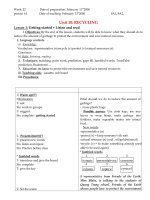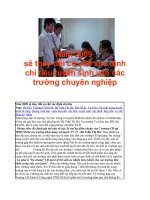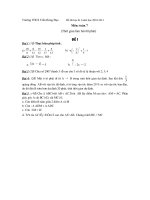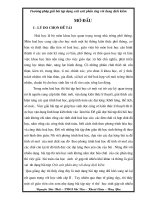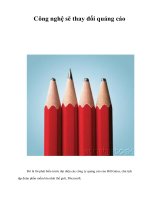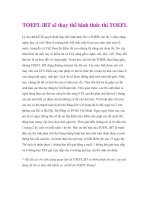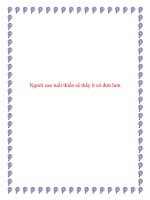Xem se thay
Bạn đang xem bản rút gọn của tài liệu. Xem và tải ngay bản đầy đủ của tài liệu tại đây (42.86 KB, 3 trang )
Dai Tu secondary school
I. Fill in the blanks with: of, about, up, at, with, after
1. You must queue......in a long time before the box-office
2. The main film comes............the news
3. Mary was...........the seaside for three days
4. I am sure............my plan
5. The naughty pupils laugh...............the newcomers
6. The show usually begins..............a cartoon.
II. Fill in the blanks with: during, about, up, of, out, into, with
1. The table of my teacher is full...........books.
2. If we fall asleep............the performance, it's a waste.........time
3. Girls burst.........tears when the price killed himself.
4. The curtain was pulled..................the scenery looked beautiful.
5. We can leave....................the ending of the story.
6. Mr. Green was busy..................his work all day.
III. Fill in the blanks with: for, of, from, in, with, about,up, on, at
1. What is rubber most useful................? We've seen knives made........steel
2. This cake is made...............milk, butter and flour. That television set is made......Japan.
3. Alice's school has just set...............a workshop.
4. Tom is not old enough to work................machines.
5. They are telling their father...........new workshop.
6. They said upper boys would make furniture...........the canteen.
7. What's the trouble.......Tom? Tom always takes good care.........his teeth. He is
afraid...........pulling it out.
8. I saw a car.............the way to the fair.
IV. Complete the text by filling the spaces with the correct prepositions:
Mr. Lovell was accused .......treating the dogs badly. They all belonged..........her and they
all suffered..........neglect. This was one reason her neighbours complained...............them
and why they wanted to prevented her...........the poor condition..........the animals. The
judge has said that he does not believe.......punishment for cases like this and that sending
her.........prison would be " completely wrong".
Some structures:
- With a view to doing smt: Với mục đích để làm gì
- To be far from doing smt: Nó còn xa để làm gì
- Chance of doing smt: Cơ hội để làm gì
- Suspect smb of doing smt: Nghi ngờ ai làm điều gì
- Forgive smb for doing smt: Tha thứ cho ai về việc gì
- It's no good/ It's no use doing smt: Thật vô ích làm gì
- There is no point in doing smt: Không có ích lợi ......
- Have difficulty in doing smt: Gặp khó khăn trong việc gì
- A waste of time/ money doing smt: Tốn tiền, mất thì gian làm gì
- Accuse smb of doing smt: Buộc tội ai làm điều gì
- Appove/ disappove of: Chấp thuận hay không chấp thuận làm gì
WORD FORMATION
Greenocean 981
Dai Tu secondary school
1. Noun: ( suffixes)
age: village al: refusal, burial ance: assistance
an: Cambodian ant: assistant er: teacher, cooker
dom: freedom ee: employee eer: engineer
ess: actress hood: childhood ice: service
ing: leaning, feeling ion: discussion tion: organization
ism: socialism ist: artist ity: similarity
ment: agreement ness: darkness our: behaviour
ship: friendship th: length, strength ty: poverty, liberty
or: error, doctor
2. Adjective: ( suffixes)
able: fashionable al: classical ar: popular
ic: domestic, historic an: Roman ean: European
ent: different ant: important ese: Vietnamese
ish: foolish, selfish ive: active, effective less: useless, harmless
ful: hopeful, careful like: businesslike ly: lively, costly
ous: dangerous some: handsome ward: northward
y: hearty, sporty
3. Verb: ( suffixes)
ate: vacinate fy: classify en: shorten ize: organize
miss: missunderstand ise: promise
4. Prefixation and their meaning:
+ Negative:
un: unhappy, unlucky dis: dishonest, disunion
non: nonsense il: illegal
im: impossible in: inactive, incapable
ir: irregular, irresponsible
+ Opposite:
dis: disagree, disappear
+ Repetition:
un: unlock, undo re: rewrite, review, retell
Greenocean 981
Dai Tu secondary school
Modal verb + Perfect infinitive
( Dùng cho quá khứ)
1. Must + have + V(p
2
): Chắc chắn rằng
Dùng để diễn đạt một sự phỏng đoán hay suy diễn về việc chắc chắn đã xảy ra trong quá
khứ
Eg1: I rang but there was no answer
=> Everybody must have gone out
Eg2: The phone rang but I didn't hear it
=> I must have been a sleep
2. May/ might/ could + have + V(p
2
): Có lẽ đã
Dùng để suy đoán một việc có thể đã xảy ra trong quá khứ
Eg1: Why wasn't Mary in class?
=> She may/ might/ could have been sick
Eg2: I can't find Peter anywhere.
=> He might have gone shopping
3. Can + have + V(p
2
): Chắc rằng không
Dùng để diễn đạt một việc mà bạn nghĩ rằng nó chắc chắn không xảy ra
Eg1: He walked from London to Cambrige in three hours
=> He can have done it on that time. Someone must have given him a lift.
Eg2: He has two bottles of Coke and he has got drunk.
=> He can have got drunk of Coke. He must have drunk alcohol with it
4. Need + have + V(p
2
): Lẽ ra phải
Eg1: You need have watered the flowers. They all died now
Eg2: She need have been careful. They need have helped each other.
5. Needn't + have + V(p
2
): Lẽ ra không cần phải
Eg: He needn't have watered the flowers. It was raining all day
6. Should + have + V(p
2
): Lẽ ra nên làm
Shouldn't + have + V(p
2
): Lẽ ra không nên làm
Eg: We bought her a doll for Christmas but she didn't like
=> We should have asked her first.
Greenocean 981
